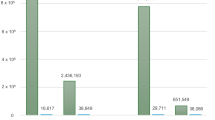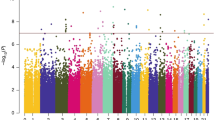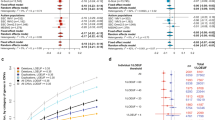Abstract
The consequence of reduced cognitive ability from inbreeding has long been investigated, mainly restricted to cousin–cousin marriages. Molecular genetic techniques now allow us to test the relationship between increased ancestral inbreeding and cognitive ability in a population of traditionally unrelated individuals. In a representative UK sample of 2329 individuals, we used genome-wide SNP data to estimate the percentage of the genome covered by runs of homozygous SNPs (ROH). This was tested for association with general cognitive ability, as well as measures of verbal and non-verbal ability. Further, association was tested between these traits and specific ROH. Burden of ROH was not associated with cognitive ability after correction for multiple testing, although burden of ROH was nominally associated with increased non-verbal cognitive ability (P=0.03). Moreover, although no individual ROH was significantly associated with cognitive ability, there was a significant bias towards increased cognitive ability in carriers of ROH (P=0.002). A potential explanation for these results is increased positive assortative mating in spouses with higher cognitive ability, although we found no evidence in support of this hypothesis in a separate sample. Reduced minor allele frequency across the genome was associated with higher cognitive ability, which could contribute to an apparent increase in ROH. This may reflect minor alleles being more likely to be deleterious.
Similar content being viewed by others
Log in or create a free account to read this content
Gain free access to this article, as well as selected content from this journal and more on nature.com
or
References
Morton NE : Effect of inbreeding on IQ and mental retardation. Proc Natl Acad Sci USA 1978; 75: 3906–3908.
Woodley MA : Inbreeding depression and IQ in a study of 72 countries. Intelligence 2009; 37: 268–276.
Jensen AR : Effects of inbreeding on mental-ability factors. Personality and Individual Differences 1983; 4: 71–87.
Schuurs-Hoeijmakers JH, Hehir-Kwa JY, Pfundt R et al: Homozygosity mapping in outbred families with mental retardation. Eur J Hum Genet 2011; 19: 597–601.
Guilmatre A, Dubourg C, Mosca AL et al: Recurrent rearrangements in synaptic and neurodevelopmental genes and shared biologic pathways in schizophrenia, autism, and mental retardation. Arch Gen Psychiatry 2009; 66: 947–956.
Vissers LE, de Ligt J, Gilissen C et al: A de novo paradigm for mental retardation. Nat Genet 2010; 42: 1109–1112.
Keller MC, Visscher PM, Goddard ME : Quantification of inbreeding due to distant ancestors and its detection using dense single nucleotide polymorphism data. Genetics 2011; 189: 237–249.
Verweij KJ, Yang J, Lahti J et al: Maintenance of genetic variation in human personality: testing evolutionary models by estimating heritability due to common causal variants and investigating the effect of distant inbreeding. Evolution 2012; 66: 3238–3251.
Keller MC, Simonson MA, Ripke S et al: Runs of homozygosity implicate autozygosity as a schizophrenia risk factor. PLoS Genet 2012; 8: e1002656.
Simon-Sanchez J, Kilarski LL, Nalls MA et al: Cooperative genome-wide analysis shows increased homozygosity in early onset Parkinson's disease. Plos One 2012; 7: e28787.
McQuillan R, Eklund N, Pirastu N et al: Evidence of inbreeding depression on human height. PLoS Genet 2012; 8: e1002655.
Vandenburg SG : Assortative mating, or who marries whom? Behav Genet 1972; 2: 127–157.
Reynolds CA, Baker LA, Pedersen NL : Multivariate models of mixed assortment: phenotypic assortment and social homogamy for education and fluid ability. Behav Genet 2000; 30: 455–476.
van Leeuwen M, van den Berg SM, Boomsma DI : A twin-family study of general IQ. Learning and Individual Differences 2008; 18: 76–88.
Mascie-Taylor CG : Spouse similarity for IQ and personality and convergence. Behav Genet 1989; 19: 223–227.
Loehlin JC : Heredity-environment analyses of Jencks's IQ correlations. Behav Genet 1978; 8: 415–436.
Davies G, Tenesa A, Payton A et al: Genome-wide association studies establish that human intelligence is highly heritable and polygenic. Mol Psychiatry 2011; 16: 996–1005.
Davis OS, Butcher LM, Docherty SJ et al: A three-stage genome-wide association study of general cognitive ability: hunting the small effects. Behav Genet 2010; 40: 759–767.
Trouton A, Spinath FM, Plomin R : Twins early development study (TEDS): a multivariate, longitudinal genetic investigation of language, cognition and behavior problems in childhood. Twin Res 2002; 5: 444–448.
Oliver BR, Plomin R : Twins' Early Development Study (TEDS): a multivariate, longitudinal genetic investigation of language, cognition and behavior problems from childhood through adolescence. Twin Res Hum Genet 2007; 10: 96–105.
Kovas Y, Haworth CM, Dale PS, Plomin R : The genetic and environmental origins of learning abilities and disabilities in the early school years. Monogr Soc Res Child Dev 2007; 72 (): vii 1–144.
Plomin R, Davis OSP : Common DNA markers can account for at least half of the genetic influence on cognitive abilities. Psychol Sci 2013; 24: 562–568.
Barrett JC, Lee JC, Lees CW et al: Genome-wide association study of ulcerative colitis identifies three new susceptibility loci, including the HNF4A region. Nat Genet 2009; 41: 1330–1334.
Davis OS, Haworth CM, Plomin R : Learning abilities and disabilities: generalist genes in early adolescence. Cognitive neuropsychiatry 2009; 14: 312–331.
Wechsler D : Wechsler intelligence scale for children- third edition UK (WISC-IIIUK) Manual, London, UK: The Psychological Corporation, 1992.
McCarthy D : McCarthy scales of children’s abilities. New York, NY, USA: The Psychological Corporation, 1972.
Davis OSP, Arden R, Plomin R : g in middle childhood: Moderate genetic and shared environmental influence using diverse measures of general cognitive ability at 7, 9 and 10 years in a large population sample of twins. Intelligence 2008; 36: 68–80.
Howrigan DP, Simonson MA, Keller MC : Detecting autozygosity through runs of homozygosity: a comparison of three autozygosity detection algorithms. Bmc Genomics 2011; 12: 460.
Purcell S, Neale B, Todd-Brown K et al: PLINK: a tool set for whole-genome association and population-based linkage analyses. Am J Hum Genet 2007; 81: 559–575.
DeFries JC, Johnson RC, Kuse AR et al: Familial resemblance for specific cognitive abilities. Behav Genet 1979; 9: 23–43.
Wilson JR, De Fries JC, McClearn GE, Vanderberg SG, Johnson RC, Rashad MN : Cognitive abilities: use of family data as a control to assess sex and age differences in two ethnic groups. Int J Aging Hum Dev 1975; 6: 261–276.
Nagoshi CT, Johnson RC, DeFries JC, Wilson JR, Vandenberg SG : Group differences and first principal-component loadings in the Hawaii family study of cognition: a test of the generality of ‘Spearman's hypothesis’. Personality and Individual Differences 1984; 5: 751–753.
Acknowledgements
Twins Early Development Study (TEDS) is supported by a program grant to RP from the UK Medical Research Council [G0901245; and previously G0500079], with additional support from the US National Institutes of Health [HD044454; HD046167; HD059215]. Genome-wide genotyping was made possible by grants from the Wellcome Trust Case Control Consortium 2 project [085475/B/08/Z; 085475/Z/08/Z]. RP is supported by a Medical Research Council Research Professorship award [G19/2] and a European Research Council Advanced Investigator award [295366].
Author information
Authors and Affiliations
Consortia
Corresponding author
Ethics declarations
Competing interests
The authors declare no conflict of interest.
Additional information
Supplementary Information accompanies this paper on European Journal of Human Genetics website
Supplementary information
Membership of Wellcome Trust Case Control Consortium 2
Membership of Wellcome Trust Case Control Consortium 2
Management Committee
Peter Donnelly (Chair)1,2, Ines Barroso (Deputy Chair)3, Jenefer M Blackwell4,5, Elvira Bramon6, Matthew A Brown7, Juan P Casas8, Aiden Corvin9, Panos Deloukas3, Audrey Duncanson10, Janusz Jankowski11, Hugh S Markus12, Christopher G Mathew13, Colin NA Palmer14, Robert Plomin15, Anna Rautanen1, Stephen J Sawcer16, Richard C Trembath13, Ananth C Viswanathan17, Nicholas W Wood18
Data and Analysis Group
Chris C A Spencer1, Gavin Band1, Céline Bellenguez1, Colin Freeman1, Garrett Hellenthal1, Eleni Giannoulatou1, Matti Pirinen1, Richard Pearson1, Amy Strange1, Zhan Su1, Damjan Vukcevic1, Peter Donnelly1,2
DNA, Genotyping, Data QC and Informatics Group
Cordelia Langford3, Sarah E Hunt3, Sarah Edkins3, Rhian Gwilliam3, Hannah Blackburn3, Suzannah J Bumpstead3, Serge Dronov3, Matthew Gillman3, Emma Gray3, Naomi Hammond3, Alagurevathi Jayakumar3, Owen T McCann3, Jennifer Liddle3, Simon C Potter3, Radhi Ravindrarajah3, Michelle Ricketts3, Matthew Waller3, Paul Weston3, Sara Widaa3, Pamela Whittaker3, Ines Barroso3, Panos Deloukas3.
Publications Committee
Christopher G Mathew (Chair)13, Jenefer M Blackwell4,5, Matthew A Brown7, Aiden Corvin9, Chris C A Spencer1
1Wellcome Trust Centre for Human Genetics, University of Oxford, Roosevelt Drive, Oxford OX3 7BN, UK; 2Department of Statistics, University of Oxford, Oxford OX1 3TG, UK; 3Wellcome Trust Sanger Institute, Wellcome Trust Genome Campus, Hinxton, Cambridge CB10 1SA, UK; 4Telethon Institute for Child Health Research, Centre for Child Health Research, University of Western Australia, 100 Roberts Road, Subiaco, Western Australia 6008; 5Cambridge Institute for Medical Research, University of Cambridge School of Clinical Medicine, Cambridge CB2 0XY, UK; 6Department of Psychosis Studies, NIHR Biomedical Research Centre for Mental Health at the Institute of Psychiatry, King’s College London and The South London and Maudsley NHS Foundation Trust, Denmark Hill, London SE5 8AF, UK; 7University of Queensland Diamantina Institute, Brisbane, Queensland, Australia; 8Department Epidemiology and Population Health, London School of Hygiene and Tropical Medicine, London WC1E 7HT and Department Epidemiology and Public Health, University College London WC1E 6BT, UK; 9Neuropsychiatric Genetics Research Group, Institute of Molecular Medicine, Trinity College Dublin, Dublin 2, Eire; 10Molecular and Physiological Sciences, The Wellcome Trust, London NW1 2BE, UK; 11Department of Oncology, Old Road Campus, University of Oxford, Oxford OX3 7DQ, UK, Digestive Diseases Centre, Leicester Royal Infirmary, Leicester LE7 7HH, UK and Centre for Digestive Diseases, Queen Mary University of London, London E1 2AD, UK; 12Clinical Neurosciences, St George's University of London, London SW17 0RE; 13King’s College London Dept Medical and Molecular Genetics, King’s Health Partners, Guy’s Hospital, London SE1 9RT, UK; 14Biomedical Research Centre, Ninewells Hospital and Medical School, Dundee DD1 9SY, UK; 15King’s College London Social, MRC Genetic and Developmental Psychiatry Centre, Institute of Psychiatry, Denmark Hill, London SE5 8AF, UK; 16University of Cambridge Dept Clinical Neurosciences, Addenbrooke’s Hospital, Cambridge CB2 0QQ, UK; 17NIHR Biomedical Research Centre for Ophthalmology, Moorfields Eye Hospital NHS Foundation Trust and UCL Institute of Ophthalmology, London EC1V 2PD, UK; 18Dept Molecular Neuroscience, Institute of Neurology, Queen Square, London WC1N 3BG, UK.
Rights and permissions
About this article
Cite this article
Power, R., Nagoshi, C., DeFries, J. et al. Genome-wide estimates of inbreeding in unrelated individuals and their association with cognitive ability. Eur J Hum Genet 22, 386–390 (2014). https://doi.org/10.1038/ejhg.2013.155
Received:
Revised:
Accepted:
Published:
Issue date:
DOI: https://doi.org/10.1038/ejhg.2013.155
Keywords
This article is cited by
-
Runs of homozygosity: windows into population history and trait architecture
Nature Reviews Genetics (2018)
-
Genomic analysis of family data reveals additional genetic effects on intelligence and personality
Molecular Psychiatry (2018)
-
Effects of autozygosity and schizophrenia polygenic risk on cognitive and brain developmental trajectories
European Journal of Human Genetics (2018)
-
Weighted likelihood inference of genomic autozygosity patterns in dense genotype data
BMC Genomics (2017)
-
Genome-wide autozygosity is associated with lower general cognitive ability
Molecular Psychiatry (2016)



